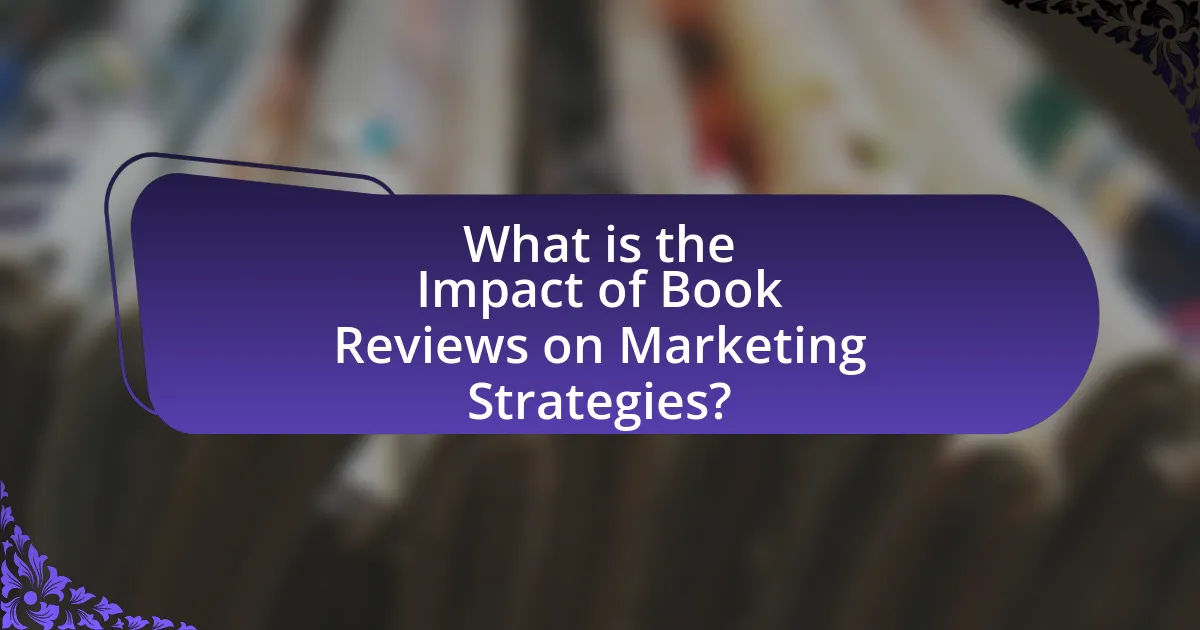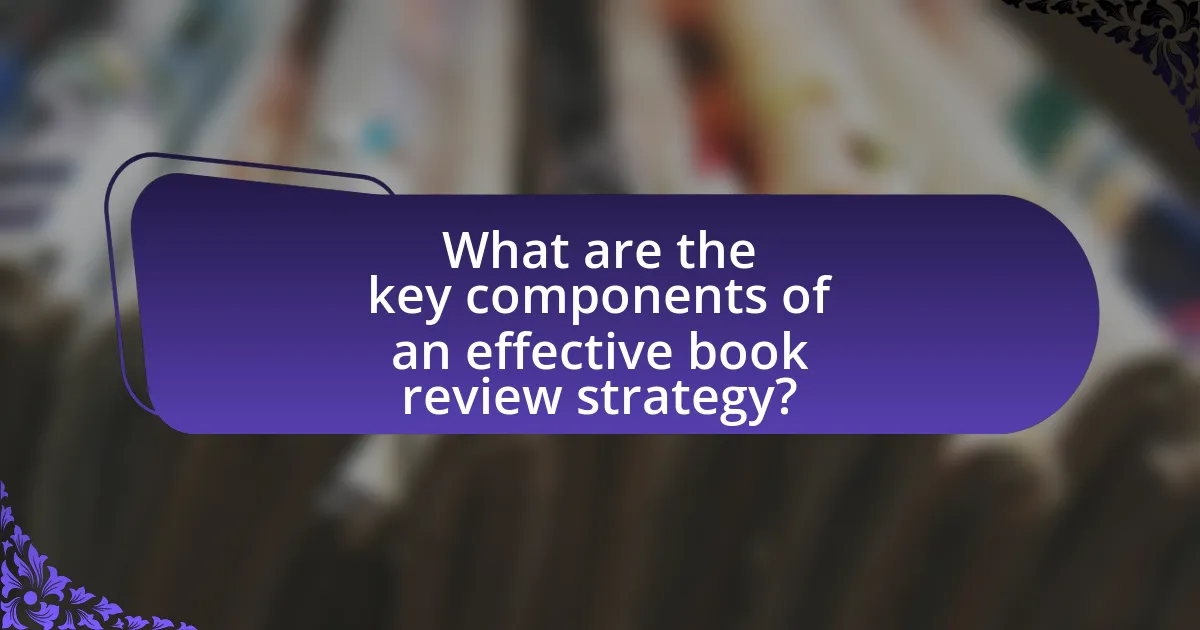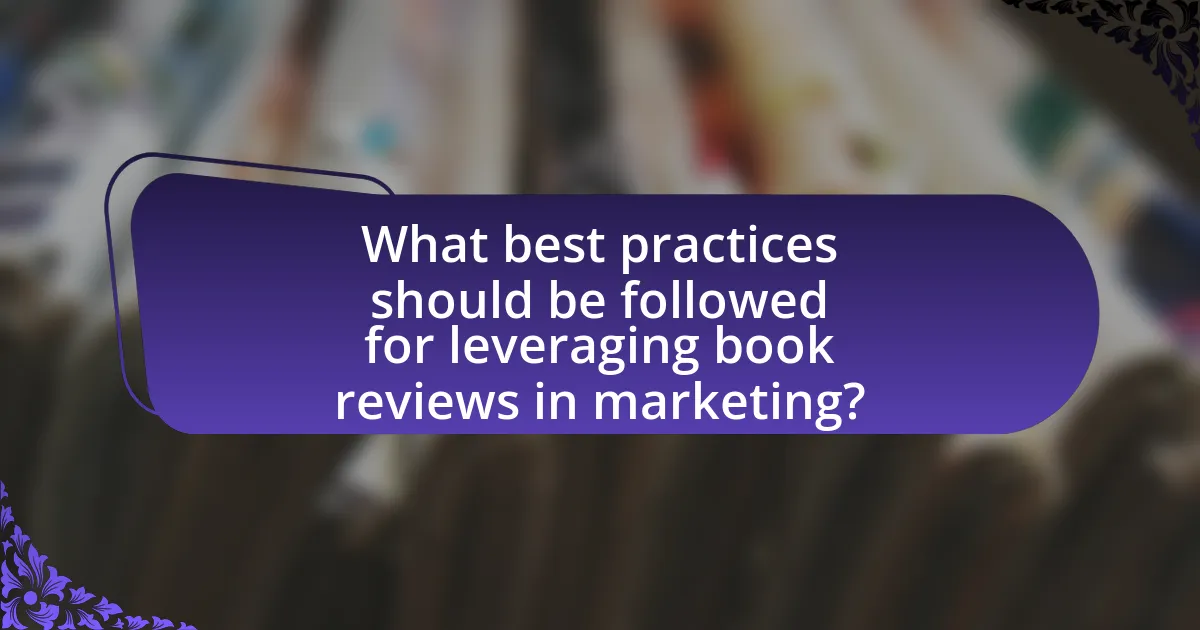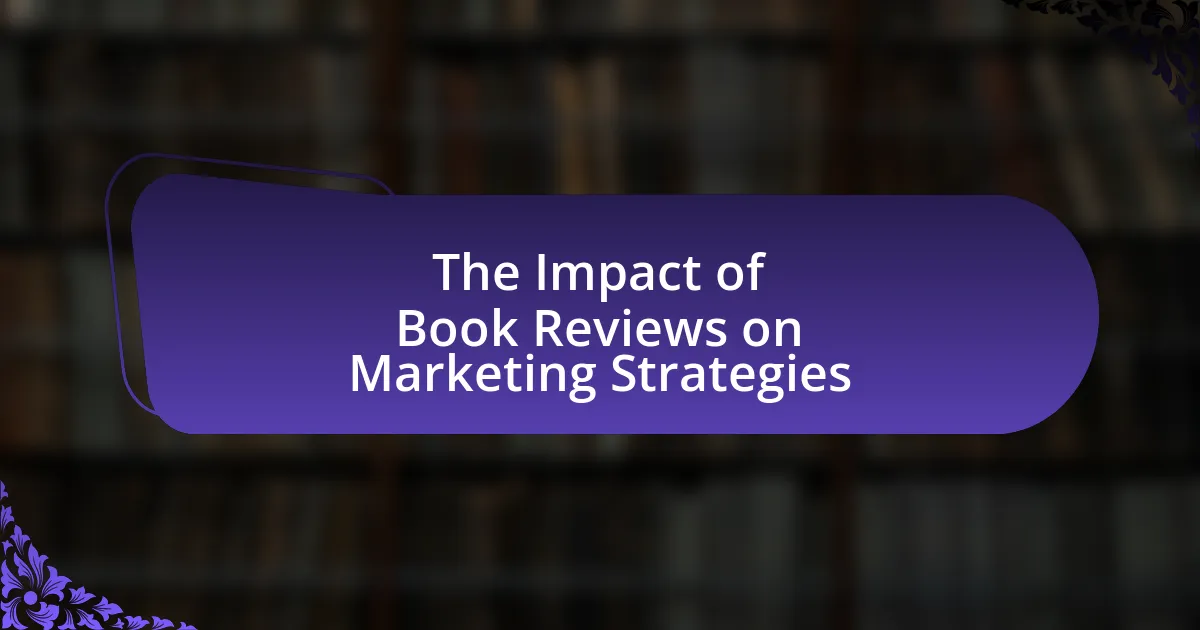The article examines the significant impact of book reviews on marketing strategies, highlighting how they shape consumer perceptions and influence purchasing decisions. It discusses the correlation between review sentiment and sales performance, noting that positive reviews enhance credibility and visibility, while negative reviews can deter potential readers. Key psychological factors that make reviews persuasive, the role of different review platforms, and best practices for soliciting and responding to reviews are also explored. Additionally, the article emphasizes the importance of leveraging reviews in promotional campaigns and the benefits of engaging with both positive and negative feedback to enhance author reputation and reader relationships.

What is the Impact of Book Reviews on Marketing Strategies?
Book reviews significantly influence marketing strategies by shaping consumer perceptions and driving purchasing decisions. Positive reviews enhance a book’s credibility, leading to increased visibility and sales, while negative reviews can deter potential readers. Research indicates that 79% of consumers trust online reviews as much as personal recommendations, highlighting their importance in marketing. Additionally, books with higher ratings on platforms like Goodreads or Amazon often see a boost in sales, demonstrating the direct correlation between review sentiment and market performance.
How do book reviews influence consumer purchasing decisions?
Book reviews significantly influence consumer purchasing decisions by shaping perceptions of a book’s quality and appeal. Research indicates that 79% of consumers trust online reviews as much as personal recommendations, highlighting the power of reviews in guiding choices. Positive reviews can enhance a book’s visibility and credibility, leading to increased sales, while negative reviews can deter potential buyers. A study published in the Journal of Marketing Research found that books with higher ratings on platforms like Goodreads experience a notable increase in sales, demonstrating the direct correlation between review sentiment and purchasing behavior.
What psychological factors make book reviews persuasive?
The psychological factors that make book reviews persuasive include social proof, authority, and emotional appeal. Social proof influences readers by showcasing the popularity of a book through positive reviews, leading potential readers to believe that if many others enjoyed it, they will too. Authority comes into play when reviews are written by credible sources or experts, which enhances trust and validation of the book’s quality. Emotional appeal engages readers by connecting with their feelings, often through relatable experiences or compelling narratives in the reviews. Research indicates that these factors significantly affect consumer behavior, as demonstrated in a study published in the Journal of Consumer Research, which found that social validation and expert opinions can increase the likelihood of purchase decisions.
How do positive and negative reviews affect sales differently?
Positive reviews generally enhance sales by building consumer trust and encouraging purchases, while negative reviews tend to deter potential buyers and decrease sales. Research indicates that products with a higher number of positive reviews can see an increase in sales by up to 18%, as consumers often rely on the experiences of others to inform their purchasing decisions. Conversely, negative reviews can lead to a significant drop in sales, with studies showing that even a single negative review can reduce sales by approximately 22%. This demonstrates that the sentiment expressed in reviews directly influences consumer behavior and purchasing patterns.
What role do book reviews play in brand perception?
Book reviews significantly influence brand perception by shaping consumer opinions and trust. Positive reviews enhance a brand’s credibility and attract potential readers, while negative reviews can deter them. Research indicates that 79% of consumers trust online reviews as much as personal recommendations, highlighting the importance of reviews in establishing a brand’s reputation. Furthermore, a study published in the Journal of Marketing Research found that books with higher ratings and more reviews tend to sell better, demonstrating the direct correlation between favorable reviews and brand success.
How can book reviews enhance or damage an author’s reputation?
Book reviews can significantly enhance or damage an author’s reputation depending on their content and reception. Positive reviews can elevate an author’s status, leading to increased visibility, credibility, and sales; for instance, a favorable review in a reputable publication can attract new readers and establish the author as a credible voice in their genre. Conversely, negative reviews can tarnish an author’s reputation, resulting in decreased sales and a loss of reader trust; a harsh critique can deter potential readers and diminish the author’s perceived expertise. Research indicates that 70% of readers consult reviews before purchasing a book, underscoring the critical role reviews play in shaping public perception and influencing marketing strategies.
What is the relationship between book reviews and reader trust?
Book reviews significantly influence reader trust by providing social proof and insights into the quality of a book. When potential readers encounter positive reviews, they are more likely to perceive the book as credible and worth their time, which enhances their trust in both the book and the author. Research indicates that 79% of consumers trust online reviews as much as personal recommendations, highlighting the importance of reviews in shaping perceptions. Furthermore, a study published in the Journal of Marketing Research found that books with higher ratings and more reviews tend to sell better, demonstrating that reader trust, bolstered by reviews, directly impacts purchasing decisions.
How do different platforms for book reviews impact marketing strategies?
Different platforms for book reviews significantly influence marketing strategies by shaping audience engagement and visibility. For instance, platforms like Goodreads and Amazon provide user-generated reviews that can enhance a book’s credibility and attract potential readers. Research indicates that 79% of consumers trust online reviews as much as personal recommendations, highlighting the importance of positive reviews on these platforms in driving sales. Additionally, social media platforms allow authors and publishers to engage directly with readers, fostering community and encouraging word-of-mouth marketing. This interaction can lead to increased visibility and sales, as 70% of consumers are more likely to purchase a book after seeing it recommended on social media. Therefore, leveraging various review platforms effectively can optimize marketing strategies and enhance a book’s market presence.
What are the advantages of using social media for book reviews?
Using social media for book reviews offers several advantages, including increased visibility, audience engagement, and real-time feedback. Social media platforms allow authors and publishers to reach a broader audience, as posts can be shared and liked, amplifying the review’s reach. For instance, a study by the Pew Research Center found that 69% of adults in the U.S. use social media, providing a vast potential audience for book reviews. Additionally, social media facilitates direct interaction between readers and authors, fostering a community around the book and enhancing reader loyalty. Real-time feedback from readers can also help authors and publishers adjust their marketing strategies effectively, making social media a valuable tool in the book marketing landscape.
How do traditional review platforms compare to modern digital ones?
Traditional review platforms, such as print magazines and newspapers, differ significantly from modern digital platforms like social media and online review sites in terms of accessibility and immediacy. Traditional platforms often have longer lead times for publication and limited reach, whereas digital platforms allow for instant feedback and a broader audience engagement. For instance, a study by Nielsen found that 70% of consumers trust online reviews, highlighting the influence of digital platforms on purchasing decisions. This shift has transformed marketing strategies, as authors and publishers increasingly prioritize digital reviews to enhance visibility and credibility in a fast-paced market.

What are the key components of an effective book review strategy?
An effective book review strategy includes clear objectives, targeted audience engagement, and structured content. Clear objectives ensure that the review aligns with marketing goals, such as increasing visibility or driving sales. Targeted audience engagement involves identifying the specific demographic that the book appeals to, allowing for tailored messaging that resonates with potential readers. Structured content, which typically includes a summary, analysis, and personal reflection, enhances readability and provides valuable insights, making the review more impactful. Research indicates that well-structured reviews can increase reader interest by up to 70%, demonstrating their importance in marketing strategies.
How can authors and publishers encourage more reviews?
Authors and publishers can encourage more reviews by actively engaging with their readers and creating incentives for feedback. For instance, they can request reviews directly through email newsletters or social media, making it easy for readers to share their thoughts. Research indicates that personalized requests significantly increase the likelihood of receiving reviews, as readers feel more connected to the author. Additionally, offering incentives such as discounts on future purchases or entry into giveaways can motivate readers to leave reviews. According to a study published in the Journal of Marketing Research, 70% of consumers are more likely to write a review when incentivized.
What tactics can be used to solicit reviews from readers?
To solicit reviews from readers, authors can employ several effective tactics. One common approach is to directly ask readers for feedback at the end of the book, providing a clear call to action. Research indicates that personalized requests, such as sending follow-up emails to readers who have engaged with the book, can significantly increase the likelihood of receiving reviews. Additionally, offering incentives, such as exclusive content or entry into a giveaway, can motivate readers to share their thoughts. Engaging with readers on social media platforms and encouraging them to post reviews can also enhance visibility and prompt more responses. According to a study by the Book Industry Study Group, books with more reviews tend to have higher sales, demonstrating the importance of actively soliciting reader feedback.
How important is timing in requesting reviews?
Timing is crucial in requesting reviews, as it significantly influences the likelihood of receiving positive feedback. Research indicates that asking for reviews shortly after a purchase or experience maximizes the chances of a favorable response, with studies showing that requests made within 24 to 48 hours yield the highest engagement rates. This is because customers are more likely to remember their experience and feel motivated to share their thoughts while the experience is still fresh. Additionally, a survey by BrightLocal found that 70% of consumers will leave a review if asked within this optimal timeframe, underscoring the importance of timing in the review solicitation process.
What metrics should be tracked to measure the impact of book reviews?
To measure the impact of book reviews, key metrics to track include review volume, average rating, engagement metrics (such as comments and shares), conversion rates, and sales data. Review volume indicates the quantity of feedback received, while average rating reflects overall reader satisfaction. Engagement metrics show how actively readers are interacting with the reviews, which can influence potential buyers. Conversion rates measure how many readers who viewed the reviews went on to purchase the book, and sales data provides direct insight into the financial impact of the reviews. Collectively, these metrics offer a comprehensive view of how book reviews affect marketing strategies and sales performance.
Which key performance indicators are most relevant?
The most relevant key performance indicators (KPIs) for assessing the impact of book reviews on marketing strategies include review volume, average rating, and conversion rate. Review volume indicates the number of reviews received, which correlates with consumer trust and visibility; a higher volume often leads to increased sales. Average rating reflects the overall quality perception of the book, influencing potential buyers’ decisions. Conversion rate measures the percentage of visitors who make a purchase after reading reviews, directly linking reviews to sales effectiveness. These KPIs provide concrete metrics that demonstrate how book reviews can enhance marketing strategies and drive sales.
How can feedback from reviews be utilized for future marketing efforts?
Feedback from reviews can be utilized for future marketing efforts by analyzing customer sentiments to refine messaging and target audiences more effectively. By categorizing feedback into positive and negative sentiments, marketers can identify key themes that resonate with readers, such as specific genres or writing styles that attract attention. For instance, a study by BrightLocal in 2020 found that 79% of consumers trust online reviews as much as personal recommendations, indicating that leveraging positive feedback in promotional materials can enhance credibility and attract new customers. Additionally, addressing negative feedback can inform product improvements and demonstrate responsiveness to customer needs, which can be highlighted in marketing campaigns to build trust and loyalty.

What best practices should be followed for leveraging book reviews in marketing?
To effectively leverage book reviews in marketing, authors and publishers should actively seek authentic reviews from credible sources and strategically share them across various platforms. Authentic reviews enhance credibility and influence potential readers’ purchasing decisions, as studies show that 79% of consumers trust online reviews as much as personal recommendations. Additionally, utilizing excerpts from positive reviews in promotional materials, such as social media posts and email newsletters, can increase visibility and engagement. Engaging with reviewers by thanking them or addressing their feedback fosters community and encourages more reviews, further amplifying marketing efforts.
How can authors effectively respond to reviews?
Authors can effectively respond to reviews by acknowledging the feedback, expressing gratitude, and addressing specific points raised by the reviewer. This approach fosters a positive relationship with readers and demonstrates that the author values their opinions. For instance, responding to constructive criticism can show a willingness to improve and engage with the audience, which can enhance the author’s reputation and encourage more readers to explore their work. Research indicates that authors who actively engage with reviews can increase their visibility and sales, as positive interactions often lead to word-of-mouth recommendations and a stronger author brand.
What are the benefits of engaging with both positive and negative reviews?
Engaging with both positive and negative reviews enhances customer trust and provides valuable insights for improvement. Positive reviews reinforce brand credibility and encourage potential customers to make purchases, as studies show that 84% of people trust online reviews as much as personal recommendations. Negative reviews, on the other hand, offer critical feedback that can highlight areas for improvement, allowing businesses to address concerns and demonstrate responsiveness. Research indicates that responding to negative reviews can increase customer loyalty, with 33% of customers stating they would consider a business more favorably if it addressed their complaints. Thus, engaging with both types of reviews not only builds a positive brand image but also fosters continuous improvement and customer satisfaction.
How can responses to reviews enhance reader relationships?
Responses to reviews enhance reader relationships by demonstrating engagement and appreciation for reader feedback. When authors or publishers respond to reviews, they create a dialogue that fosters a sense of community and connection with readers. This interaction can lead to increased reader loyalty, as studies show that personalized responses can improve customer satisfaction and encourage repeat interactions. For instance, a survey by the Harvard Business Review found that businesses that actively engage with customer feedback see a 20% increase in customer retention. Thus, responding to reviews not only acknowledges the reader’s opinion but also strengthens the overall relationship between the reader and the author or publisher.
What strategies can be implemented to maximize the benefits of book reviews?
To maximize the benefits of book reviews, authors and publishers should actively engage with reviewers, leverage social media for promotion, and encourage reader interaction. Engaging with reviewers fosters relationships that can lead to more in-depth reviews and increased visibility. Utilizing social media platforms allows for broader dissemination of reviews, reaching potential readers effectively. Encouraging readers to leave reviews enhances credibility and can influence purchasing decisions, as studies show that 70% of consumers trust online reviews as much as personal recommendations. These strategies collectively enhance the marketing impact of book reviews, driving sales and building a loyal readership.
How can reviews be integrated into promotional campaigns?
Reviews can be integrated into promotional campaigns by utilizing them as testimonials in marketing materials. This approach leverages positive feedback to build credibility and attract potential customers. For instance, incorporating excerpts from favorable reviews in social media posts, email newsletters, and on websites can enhance engagement and trust. Research indicates that 79% of consumers trust online reviews as much as personal recommendations, highlighting their effectiveness in influencing purchasing decisions. By strategically placing reviews in promotional content, businesses can significantly improve their marketing impact and drive sales.
What role do influencer partnerships play in amplifying book reviews?
Influencer partnerships significantly amplify book reviews by leveraging the influencer’s established audience and credibility. When influencers share their thoughts on a book, they not only reach a wider audience but also enhance the perceived value of the review due to their authority in the literary community. For instance, a study by the Digital Marketing Institute found that 49% of consumers depend on influencer recommendations, which can lead to increased visibility and sales for the book being reviewed. This dynamic creates a powerful synergy where the influencer’s endorsement can drive engagement and trust, ultimately influencing purchasing decisions among their followers.
What practical tips can authors use to improve their marketing strategies through book reviews?
Authors can improve their marketing strategies through book reviews by actively seeking and leveraging authentic feedback from readers. Engaging with readers on platforms like Goodreads or Amazon can enhance visibility, as positive reviews can significantly influence potential buyers; studies show that 70% of consumers trust online reviews as much as personal recommendations. Additionally, authors should consider offering free copies to book bloggers and influencers in exchange for honest reviews, which can expand their reach and credibility. Encouraging readers to leave reviews after reading can also create a steady stream of feedback, further boosting the book’s online presence and sales potential.



